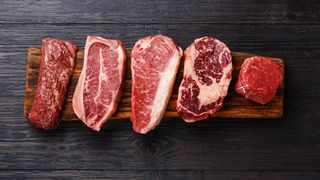What Is the All Beef Diet
Can a Person Survive Eating Only Beef?

Some people want you to pay them money so they can tell you to eat only beef. You should not follow their advice, nutritionists say.
The all-beef diet fortunately isn't much of a fad at this point, though it's got a handful of prominent supporters. And it's barely a diet. Unlike other, more popular meat-heavy diets that have at least some scientific backing, there are no reputable nutrition experts who think eating only beef is a good idea. The people who promote the diet are minor internet celebrities, spreading their ideas based on personal anecdotes of miraculous health changes and weight loss — and, of course, cashing in on the idea, as The Atlantic reported last year.
In the real world though, an all-beef diet simply doesn't have the nutritional content necessary to sustain a human being, according to Johanna DiStefano, a biochemist and head of the Diabetes and Fibrotic Disease Unit at the Translational Genomics Research Institute in Phoenix.
Related: Busted! The 7 Biggest Diet Myths
"That is the dumbest question I have heard in a long time," DiStefano said, responding to an email from Live Science that asked what would happen to a person who tried to live on only beef.
Beyond eventually leading you to run out of essential nutrients, an all-beef diet would pose a number of more basic dangers to your health, DiStefano said in a follow-up interview.
"One thing that studies show us over and over is that eating more plants, eating more of a plant-based diet, is associated with improvements in glucose homeostasis and hypertension and lipid levels," she said.
In other words, plants are connected with more-stable blood sugar, healthier blood pressure and healthier cholesterol readings.
"Beef is not," DiStefano said.
In fact, she said, animal fats are the only significant source of dangerous cholesterol for most people. Cutting meat consumption can therefore lead to significantly healthier blood.
"There's also a strong link between eating beef and certain kinds of cancer," she said. "There's very little fiber in beef. And not having fiber is associated with an increased risk of certain kinds of cancer, including colorectal cancer, as well as diabetes. So there are a lot of protections that plants and legumes and grains in your diet provide that eating meat is not going to do."
There is one large population that traditionally eats something close to an all-beef diet: the Maasai, a tribe in Kenya and Northern Tanzania who eat milk, meat, and blood almost exclusively, as a study in the journal PLOS ONE described in 2012. The Maasai generally have low blood cholesterol and don't demonstrate unusual levels of cardiac disease. However, researchers reported in that study that the Maasai also likely have genetic adaptations that help them cope with their unusual diet. Healthline noted in a 2018 article that the meat the Maasai people eat comes from animals that lead very different lives from the cows that end up in supermarkets elsewhere in the world; this could also safeguard the Maasai's overall health despite the lack of diversity in their diet.
But cancer and heart disease is not the only reason to flesh out your diet with other kinds of food, DiStefano said.
"One of the benefits of eating a diet that's diverse is that you're covering all your nutritional bases. You're getting your vitamin C. You're getting your vitamin A. You're getting other vitamins and minerals and nutrients that your body needs to function optimally," she said.
Nutritional science is still evolving, she said. But this is basic stuff. Without those key substances, things start going wrong inside a body.
"If you eat just one thing — it doesn't have to be beef, it can be apples — you're going to put yourself into a state of nutritional deficiency, because there's not one food out there that can provide everything you're going to need."
There are nutrients scientists are still learning about that turn out to be very important for long life, she said. And you're never going to get them all from a single entree.
As for folks who claim to be living and prospering long term on an all-beef diet, DiStefano suggested that's hard to believe.
"I don't think you can follow that diet for a year and be able to make that claim. Honestly, that kind of diet will catch up to someone sooner or later."
- 7 Odd Things That Raise Your Risk of Cancer (and 1 That Doesn't)
- 11 Ways Processed Food Is Different from Real Food
- 10 Do's and Don'ts to Reduce Your Risk of Cancer
Originally published on Live Science .
Source: https://www.livescience.com/carnivore-beef-diet.html
0 Response to "What Is the All Beef Diet"
Post a Comment